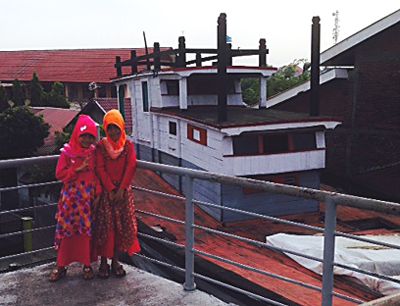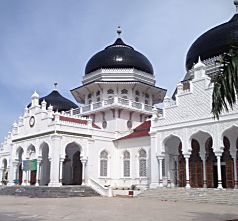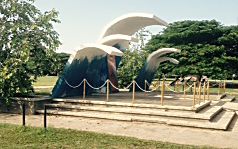In Banda Aceh, hijabs are colourful
1 July 2015
 By HAL DUELL
By HAL DUELL
I think we can all remember the tsunami of December 26, 2004. The northern Indonesian province of Aceh caught the brunt of it. Indonesia estimates between 220,000 and 330,000 people lost their lives.
The capital city of the province, Banda Aceh, was first rocked by the offshore earthquake and then flooded by the resulting tidal wave. The devastation was immense. Generous disaster relief came in from many nations, including Australia.
I had read of a Tsunami Museum built to commemorate the event, of a site showing a fishing boat resting on top of a house, of another site where a floating diesel-powered electricity generating plant was carried some five kilometers inshore and of nearby Weh Island, or Pulau Weh.
This last is a small island off the coast. It’s a declared wildlife protection area offering a coral reef for snorkeling and diving, basic accommodation and fish fresh from the Andaman Sea.
My main worries before coming to Ache centered on reports in our press concerning the imposition of Sharia Law on both locals and visitors. With the Muslim fasting month of Ramadan starting just days before my visit, I’ll admit to being apprehensive.
An overnight bus ride brought me to Banda Aceh, a trip made memorable by the provision of a blanket to counter the extreme air-conditioning and a stop just before daylight for a meal. The reason for the early meal became apparent as the day unfolded.
Arriving, I found a most laid back city with everyone going about their business as they do all over Indonesia, that is cheerfully and with open smiles and welcoming voices.
 The strict dress code that I had anticipated proved to be nothing more than the wearing of the hijab by the majority, but by no means all, of the women. This same attractive and modest head covering is worn with style and aplomb by Muslim women all over the world.
The strict dress code that I had anticipated proved to be nothing more than the wearing of the hijab by the majority, but by no means all, of the women. This same attractive and modest head covering is worn with style and aplomb by Muslim women all over the world.
For the rest, it was shirts with shorts or trousers for the men and either dresses or jeans with a top for the women. This is not at all dissimilar to what is seen throughout Indonesia.
My worries were proving to be unfounded.
Being my first day, I decided to visit the main market. After wandering past the usual fresh fruit and vegetable stalls and watching from a bridge as sleekly graceful, wooden deep water fishing boats unloaded their latest catch, I came across a new, post-tsunami, three storey building.
Inside I found a flow of shoppers browsing in air-conditioned comfort where at least 90% of the shops offered an assortment of dresses, fabric, the ubiquitous hijab and children’s clothing. Men hardly got a look in. So much for the marginalization of women that I’d heard so much about.
And the biggest inconvenience? Well, I had been forewarned that Sharia Law was the law and that the daylight fasting regime of Ramadan was enforced. What I discovered this meant was that for the first time since discovering SE Asia over 45 years ago, I could find neither restaurants nor street stalls open where I could sit and enjoy a meal with a drink while watching the street go by.
Ruing my pass on the early morning meal, it was back to my hotel with a furtive packet of Oreos and a wait for sundown.
Day two, and after declaring myself to be a non-Muslim, I sat alone to eat breakfast in the empty hotel restaurant. This was so completely at odds with the usual communal atmosphere at the complimentary breakfasts offered in SE Asian hotels, but the day’s fast had begun.
The morning then centered on a visit to the Tsunami Museum. Suffice to say it is well presented, educational and extremely sobering.
 Of equal interest to me was a walk around the park across the street from the museum. This park is large enough to hold two playing fields and is used to commemorate the post-tsunami help Indonesia received from around the world. Ringing it are plaques thanking the 53 donating nations.
Of equal interest to me was a walk around the park across the street from the museum. This park is large enough to hold two playing fields and is used to commemorate the post-tsunami help Indonesia received from around the world. Ringing it are plaques thanking the 53 donating nations.
After an initial shock followed by a careful check, I sadly realized Australia’s is the only plaque showing signs of being defaced. The metal shield has received hammer blows, and the Australian flag had been scraped almost beyond recognition.
All I could think was, thanks, Tony. You are doing some stellar work nurturing our relationship with our nearest and largest neighbor.
The beached power plant has become a suburban park overflowing with families and laughing school children. After what I had seen so far, I offered a quick thanks to all the gods for laughing school children.
Lunchtime again, so it was back to my room, this time with a bowl of instant noodles, to wait for the sundown siren.
I still have a day trip to Pulau Weh to organize, but with neither the fast nor the slow boats adhering strictly to their schedule, I’ll have to take that as I find it.
Then it will be a sighting of the fishing boat in the rafters on my way to the airport, and so will conclude my all too brief first visit to the rebuilt city of Banda Ache.
It will also conclude my first experience of a jurisdiction under Sharia Law.
The visit will be warmly remembered for a number of reasons, while the experience was only noticeable because of the strict public observation of Ramadan.
Live and let live. It’s what we all want.



@ Hal. Really, you want to blame our Prime Minister for our flag being removed by vandals or religious fanatics?
I am fed up with the “blame Tony” for everything. He is our Prime Minister. Have and show respect.
The person or persons who decided to vandalise the plaque are voicing their hate and anger at all Australians.
Get your facts in front of your prejudice, Hal.
Exactly, Janet, and we should all ask what is the reason behind their hate and anger?
These people need to be grateful to Australia especially with the foreign aid they receive from Australia.
It gave millions when they had the tsunami. I would think Tony Abbott has been very generous, especially when charity begins at home.
In the past we had the Colombo Plan to teach these people to grow food and it was destroyed. Millions or dollars wasted.
Live and let live. I agree, do what you want with sharia law and other Islamic nonsense in your own country, but keep it out of ours.
I would have to agree with Robinoz. Indonesia is a backward country and is Islamic. My advice is to stay clear. There are better choices for a holiday, plus they need us more than we need them. Slim Fred.
They need us more than we need them, writes Goliath. Of course they do, all Indonesia’s air and sea routes to NZ pass through Australian air space and seas, we could restrict their access if they get too uppity. And none of our trade routes pass through them, whew, lucky for us.
They are a backward country AND Islamic, well, that’s a double whammy.
Indonesia is the largest Muslim nation in the world, and so far is quite moderate in its brand of Islam.
Despite the actions of some extremists, Indonesia remains committed to democracy and good relations with neighbouring countries, including us.
They have resisted the temptation to stir up trouble for us in PNG, which they could easily do if they got bitter and twisted, fomenting strife along the border, necessitating further obligations on us.
Travel through Indonesia, not just Bali, and you will see a “backward Islamic country” that is dynamic and forward looking despite all its problems.
I suggest Fred that you visit Jogja, in central Java, spend a week or two there under the shade of Gunung Merapi, catch a slow train though the hills to Bandung, then on to Djakarta, then maybe a boat to the old spice islands, Banda, Ambon … you might come away with a different point of view. You will encounter enormous diversity and lots of friendly, lovely people.
@ Ian Sharp: I don’t care if they cut back the air space. I only support the Australian tourist industry. There are wonderful places to visit right here in our country.
Anyway, I don’t have time for holidaying, I have to work, I don’t receive sit down monies like a lot of people in this country. It’s not what Australia can do for me, it’s what I can do for Australia. Fred the Worker.
Yesterday it was announced that the live cattle export to Indonesia for this quarter has been slashed from 250,000 to 50,000.
Today the Indonesians have said that they may increase that number to 200,000 if local demand warrants it.
Let’s hope that the demand warrants it as cattle in the Top End are now in holding pens or holding paddocks in anticipation of the larger quota. And this at a time of exceptionally good prices for our graziers.
The argument that Indonesia needs us more than we need them is debatable.
Australia’s ill-informed and patronising attitude toward our largest and nearest neighbour is looking more and more like an own goal. Indonesia is a vibrant, proud and sovereign nation, and we would be well advised to start treating it with the respect it deserves.
Demonising Indonesia, and by extension Islam, might earn a guernsey on Tony’s team, but it is manifestly not in Australia’s interest.
@ Hal: Indonesia maybe vibrant and a proud, sovereign country, but it also relies heavily on Australia for foreign aid and their tourist industry relies heavily on Australia.
If it is so vibrant, why are they leaving in droves? Was it an act of love when the Bali bombing happened? Is that what they call religious love?
Sweeping statements once again from Fearfull Fred the anonymous Philistine.
Re foreign aid, we are certainly not Indonesia’s largest donor. Our aid has been useful and appreciated, and has helped develop secular schools. It’s not true to say they rely “heavily” on it … which is good, because it is not that large.
The one billion pledged after the Boxing Day Tsunami was much appreciated, but a billion is small potatoes in a country with a two and a half trillion US$ economy, more than twice as big as our own, but spread over 10 times more people.
The schools program was also in our own self-interest, to offer an alternative to the radical madrasses that indoctrinated the young men in poor rural areas who went to become terrorists.
These sorts of programs have been affected by the Abbott Government cutbacks to our foreign aid budget, surely an example of cutting off your own nose to spite your face.
The Indonesian tourist industry is not as dependent on Australia as we might think, there is much more to Indonesia than Bali. Indonesia is our second largest tourist destination, but we are only their twelfth largest source of international visitors. The largely Hindu Island of Bali is very much a special case in Indonesia, and it seems to be the attraction for many Australians.
As for them leaving the country “in droves”, well that’s just not right.
There is a fair amount of labour emigration, taking up labour-intensive jobs overseas, remitting funds to family back home … mainly women to the Middle-East as domestics and men as labourers to Malaysia, but this is largely not permanent migration, most return home to marry, raise family etc.
I wonder if Fred thinks Indonesians make up the “boat people” coming to Australia as refugees? If so, wrong again.
But why trouble yourself with facts Fred? Hiding behind your cloak of anonymity you can say what you like, keep on scribbling on that dunny wall. Ignorance is truly bliss to some.
@ Ian: Let’s stick to the points and facts. Indonesia is a third world country with majority of the people being Islamic. 50% of the people are on less than $2 a day. The reason they have to take live cattle is that not all of Indonesia has power for refrigerators. We are not interested in you being in the toilet. I guess you do a lot of scribbling on the walls.